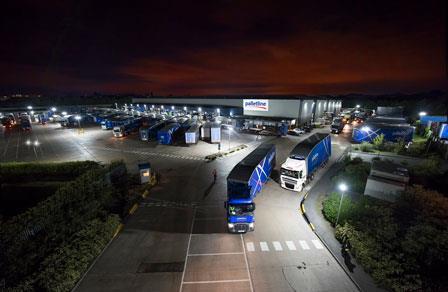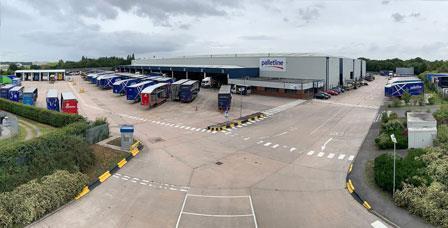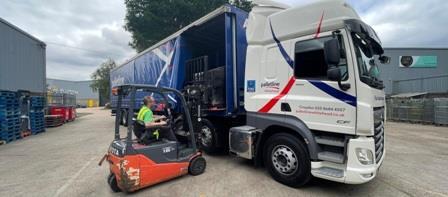
Palletline was the first pallet network to be established in the UK and celebrated its 30th anniversary in 2022. It was also a year in which the business reached new heights with record volumes.
The company’s recent announcement of a substantial programme of investment has been designed to ensure Palletline has the right platform, capacity and structure in place enabling Group MD Graham Leitch, who took the helm in January 2015, to facilitate continued expansion and drive the business forward.
Whilst he appreciates there will be some challenges ahead, Leitch is confident about the future.
One of Palletline’s key strengths is its member shareholding model, which has been in place since 1994.
Leitch explained: “Palletline is the only network that is 100% owned by members. The board has a strategy meeting every year and the first item on the agenda is always ‘is the ownership model right for the future’?
"This is simply a case of good corporate governance, but in 2022 resulted in rumours that Palletline’s shareholders were considering selling the business. On conclusion of this latest strategic review, the shareholders have again ratified the shareholder model as the optimum model for the future of the business.
“The executive team does not hold shares – we are the custodians of the business with no vested interest.”
There are four executive directors on the Palletline board: Leitch; Paul Elson, MD of Palletline Logistics which owns the nine transport companies the network has set up or acquired; Glenn Baker, network and operations director; and Michelle Roder, finance director.
In addition, there are seven shareholder directors who are elected by the members every three years.

“We meet once a month at the board meetings and the rest of the membership have that comfort that they are represented strongly on the board,” says Leitch (pictured). “Ken Hackling [owner of founder member John Hackling (Transport)] has been re-elected every three years for the past 30 years.”
The members’ shareholding varies from 0.5% to a maximum 5% which ensures it is not possible for a small number of large shareholders to effectively control or force a sale of the network.
A number of the UK’s nine pallet networks have changed hands in recent years, with TPN being bought by Eddie Stobart parent GreenWhiteStar (now part of Culina Group), Palletforce being acquired by EV Cargo, DP World acquiring Palletways from Imperial, Pall-Ex being bought from founder Hilary Devey by members and management and then Fortec being taken over by Pall-Ex.
Ownership review
Following the review of ownership structure by Palletline members, the shareholders instead chose to support a £6m investment in the network.
“The current shareholders said ‘we will invest in Palletline, there is no need to go externally for investment’, which I think is a very positive message,” says Leitch. “We believe that our current model is the only one that gives all our members a say in the business.
“Palletline is unique in that it is the only network where the shareholder members have control and that is very attractive to potential new members.”
While Leitch doesn’t like to describe Palletline as a co-operative he says it is “co-operative-ish”.
“We are a family-style business owned by family transport companies that is run in a professional manner,” he explains. “Part of that strategy is that we have the lowest hub fees in the sector by quite a considerable margin.
“The investment will come partly from those hub fees which will increase - though they will still be the lowest and best value in the sector. We own this building [the Birmingham hub] which is a £35m asset and are in a strong financial position.
“We also pay a very competitive inter-member rate so when you combine that with the hub fee the overall cost of input is the lowest in the marketplace.”
This Leitch argues allows Palletline’s 78 members to invest in their own businesses as evidenced by a delivery success rate above 98%.
It may be a cliché, but it remains true that a network is only as strong as its weakest link and many pallet network members complain that only the big inputters make money while those in areas with more deliveries suffer. Leitch says that this is certainly not true at Palletline.
“Our strategy is to have the lowest hub fee, and delivery rates in the top quartile,” he says. “When you put those two together it still provides a competitive cost of input. Over the past few years, we have built up a business information unit and that has developed a cost-to-serve model that we continually update.
“When we review our inter-member rates, we have millions of lines of data to show us what is the true cost-to-serve in each geographical area of the country. In 2022 we got Warwick University to externally verify our cost-to-serve model so we can say to the members we know we are paying the right delivery rates in each area.”
Ambitious expansion
A substantial part of the £6m investment is to fund the network’s ambitious expansion plans, though these are temporarily on hold as the UK teeters on the edge of recession. In the year to the end of June 2021 turnover increased by 19.4% to £179.4m, with volumes rising from 17,000 to more than 20,000 pallets per day.
This growth was fuelled by recovery in the manufacturing sector, as well as an increase in B2C volumes and its relationship with Amazon. Palletline is the only UK pallet network included in the ecommerce giant’s inbound preferred carrier programme, which saw a 52% volume increase between 2019 and 2021.

Palletline is based at its 234,000sq ft primary hub on 13.8 acres near Birmingham airport and opened a secondary 180,000sq ft hub that also has 28,000sq ft of canopy near Coventry airport in 2018, mainly to service Amazon’s 22 UK fulfilment centres.
“We are expanding the Birmingham hub including building a new shed which will add another 3,000 pallets to our capacity,” says Leitch. “We are timing the expansion based on volume growth and that growth has slowed.
“We were 10% behind 2021 in Q3 of 2022 – but that is still 5% ahead of 2019. We are ready to go when we need to expand, probably in early 2024.
“We are also investing in the Coventry site to extend the canopies so we can operate in the same way we do at Birmingham, which will increase our capacity by a further 3,000 pallets.”
Palletline also operates three additional regional hubs across the UK in North London, Glasgow and Haydock having recently closed Leicester.
“Our multi-hub model is a key element of capacity management as we can flex them depending on volumes,” says Leitch. “We closed Leicester at the end of 2022 because volumes were flat.
“We are expecting another spike in volumes in 2024 and by then we will have invested the £6m in Birmingham and Coventry to cope with it. If volumes go exponential as they did after the last recession then we can open another hub – though it may not be in Leicester.
“We have modelled anticipated growth right through to 2030 and we know that with the investment the capacity will be there by then.”
One way to increase hub capacity is to extend the hours it is used, though with a preponderance of next-day deliveries this can be a challenge.
“At the moment we are 56% next-day delivery. Our Birmingham site handles around 9,000 pallets a night and 3,000 during the day,” says Leitch. “Our commercial steering group is now looking at new services and alternative delivery options which would help in terms of capacity and maybe help members through the recession.”
New lift trucks will weigh every pallet
Another significant part of the investment is in a new fleet of fork-lift trucks which will have an advanced CCTV system. “We will further streamline the process enabling us to immediately spot any damage to inbound pallets and see them travel through the hub,” says Leitch. “That will improve both quality control and health and safety.”
The new system combines cameras and barcode scanners which are linked to weighing equipment fitted to all the new lift trucks. This will enable Palletline to identity pallets that are lighter or heavier than the weight declared by the shipper.

“We will know the weight of every single pallet,” says Leitch. “We introduced a 750kg limit on unassisted tail lift deliveries in 2016 and we have that constantly under review. My view is that when the regulatory bodies did their review they should have stated a weight. If that was 750kg then great and if it was 500kg then we would conform to that.
“We are comfortable with 750kg together with all other live risk assessments that drivers do as pallets are delivered.”
If an overweight pallet is detected the inputting member will be informed that it needs to go on the network’s Lift Assist service, the extra cost of which is charged back to the inputter. The delivery member then gets that additional fee because it has the added cost of using an electric pallet truck to make the delivery.
The top weight for Lift Assist using a tail lift is 1,000kg and the maximum weight the network will accept for delivery by fork-lift is 1,200kg.
“There is the option of member-to-member agreements for heavier pallets using special arrangements,” says Leitch. “We have the kit here to handle those by agreement.”
Heavy pallets foisted on members of other networks often come through central accounts sold by the hub – something that Palletline does not do.
“Central accounts are designed to drive volume through the centre and imbalance members, so they go out and sell volume for the benefit of venture capitalists or management teams,” says Leitch.
Palletline Logistics is one solution to lack of succession in family hauliers
Palletline has 78 members with 96 depots across the UK, including nine hauliers it owns through its subsidiary Palletline Logistics. Palletline opened its first wholly-owned depot in London in 2004, and now owns Ningbo Wrexham and Ningbo London, Mike Watson Transport, ABE Ledbury, S&S Distribution, Fast Forward Distribution, Palletline London, Palletline Whitehead and Palletline Northeast.
“We have strong confidence that the current membership will see us through this recession,” says Leitch. “But we have a contingency plan in place should a situation arise and we are unable to work through the difficult times with a member.”
Palletline’s risk management strategy means there is a back-up plan for every member which could include acquisition or asking other members to take on the relevant postcodes. Our preferred option of course is to recruit a new member and Leitch says that the pipeline of hauliers wanting to join Palletline is still full.

“Our first option is not to buy it ourselves,” says Leitch. “We have bought some very good businesses over the past eight years, not because we have had to buy them. They were bought to protect the integrity of the network and if they were ever sold again, we would need some form of protection.
“One of the issues in transport is the aging profile of ownership of businesses. And that's why three of the nine businesses were bought, because there was no new family coming through. The retiring owner felt the best option for their employees and their business was to sell to Palletline.
“But some of the members are on their second generation and some are now handing over to third generation.
“So, we've got some really strong businesses that have got very good internal succession plans, which is quite unusual in transport.”
Membership of more than one network is becoming more common, partly because of consolidation of small to medium size businesses which can see hauliers which are already a network member acquire a firm established in another network, and partly because in remote parts of the country it is not commercially viable to have multiple hauliers delivering small volumes.
“Consolidation in the transport sector is a factor here and we have previously been successful in convincing acquirers of our Members to join Palletline for their whole business. We have also recently worked with several of our members to reduce dual networking at Palletline,” says Leitch “and whilst we recognise that it may be necessary within some of those difficult parts of the country you would expect, we believe our shareholder ownership model provides the strength to curtail this practice in the future.”
Could Palletline become a buying group?
While pallet network members often have strong ties with their local suppliers, offering them the opportunity to pool buying power is something the Palletline management constantly researches.
The network’s new five-year contract with Linde - which will see a new fleet of forklift trucks introduced across the business, 10 of which will be electric – is a deal that any member can take advantage of, for example.
“As much as anything, it is about sharing best practice more than putting together individual deals as that can be quite difficult,” says Leitch.
This approach might become more important as zero-emissions vehicles start being introduced by members and the hubs could provide vital refuelling facilities. In his discussions with members Leitch has come to the conclusion that their large, often double-deck, trunkers will probably go hydrogen rather than battery electric.
“There is a big move to jump the electric phase and go straight to hydrogen for HGVs,” he says. “We have charging points for electric cars on site, but for trucks the infrastructure needs to be in place across the UK to meet the demand and there is not even sufficient grid capacity to cope with that at the moment.”













